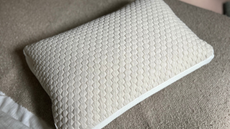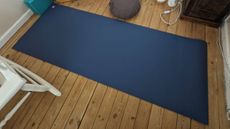Buying a new mattress is a major investment; not only (often) in monetary terms, but also because if you get the wrong one, you're in for a whole world of hassle and pain. And if, unlike me, you aren't intimately familiar with the mattress market – perhaps if the last time you bought a new mattress, it was all done in store and there was no such thing as memory foam – things can get confusing, fast.
Your first stop should be T3's best mattress guide, which walks you through our top recommendations for a range of sleep styles and budgets. However, when you come to make your decision, there are some things you might have forgotten or simply never realised, which can have a big effect on how smoothly the decision-making process goes.
To help, interior designer Sylvia James at HomeHow.co.uk has put together her list of 7 things no one tells you when you're buying a mattress.
1. More expensive doesn't always = better
"A mattress that is right for you is dependent on your individual needs, not the price," says Sylvia. "So, whilst there are many luxurious options for customers who desire top range products, be sure to shop around as the perfect mattress for you might be a bargain."
In short, price isn't an indicator that a mattress is going to be comfortable for you – things like firmness and mattress type (springs vs memory foam, for instance) can be more important. What's more, the mattress world is rife with sales, so that RRP might not really be how much the mattress is worth. T3's best cheap mattress deals page rounds up the offers worth taking notice of.
2. Check your space before sizing up
When you make your purchase, you'll need to not only decide which mattress you want, but also how big it should be. Anecdotally, I've noticed people are increasingly opting for bigger mattresses – in the UK King seems to be almost standard for couples now, and Super King isn't considered nearly as extravagant as it used to be. But a word of warning from Sylvia if you're thinking of sizing up: "Not all bedrooms can accommodate [larger bed sizes] comfortably. Measure your space before you begin your search so you can identify the best choice for your bedroom. If you are making a size increase, ensure the route makes it possible to manoeuvre, paying attention to stairways and sharp turns."
There's also the potential added confusion that different countries have different standard sizes – King in the UK is not the same as King in the US or King in mainland Europe, for instance. To clear things up, check our mattress size guide.
3. You could get a free trial run
Many of you will be looking to order your mattress online, but if you still prefer to go to a showroom, make sure you're not missing a trick. "Lying on the bed for only a few seconds in a busy store might not give you the most accurate sense of the product," says Sylvia. "Check with your retailer to see if they offer a 30-day trial in which if you're unhappy, they can exchange the mattress."
You might find it simpler, however, if you do opt for the online option. To make up for the fact that the first time you'll be seeing your new mattress will be when it arrives at your door, all the major online mattress companies offer lengthy trial periods – at least 100 nights, but occasionally right up to a year – in which to test your purchase out properly. After this time, if you don't love your new mattress, most will pick it up and either exchange or refund for free.
4. Customer reviews are key
Before you buy, do some research. "Whilst the downside of purchasing online is that you can't try it out, you should spend time reading the consumer reviews. This will provide you with a more practical idea of the mattress and help you narrow down your choices," says Sylvia. There are plenty of reviews online to consult, a number from people like me who review mattresses for a living, who can help steer you in the right direction.
5. ‘Firmness' is completely subjective
"Whilst each label will determine a mattress' level of firmness, this differs per brand, " warns Syvia. "One brand's ‘firm' could actually be another brand's ‘soft'. The only way to find out if the level is correct for you is to test it out yourself." You can also get something of an idea from reviews, although invariably there'll be at least as many people complaining a mattress is too hard as there are moaning about it being too soft...
For some advice on what you're ideally looking for, here's our guide to how firm your mattress should be.
6. It might pay to wait until spring to buy
"Mattresses tend to have larger discounts applied around early spring as retailers release their new lineups around April and need to get rid of their older models," advises Sylvia. Another good time to shop is in November – the weeks leading up to Black Friday always bring with them major price drops.
7. You should always read the fine print
All warranties were not created equal, so read the small print before you buy. "A full warranty covers repair and replacement, whilst a prorated warranty offers less coverage over time," explains Sylvia. "Make sure you read the fine print, for example, if your mattress has a 10-year full warranty plus a 10-year prorated warranty after that, you'll be reimbursed for only a fraction of the repairs after 10 years."











